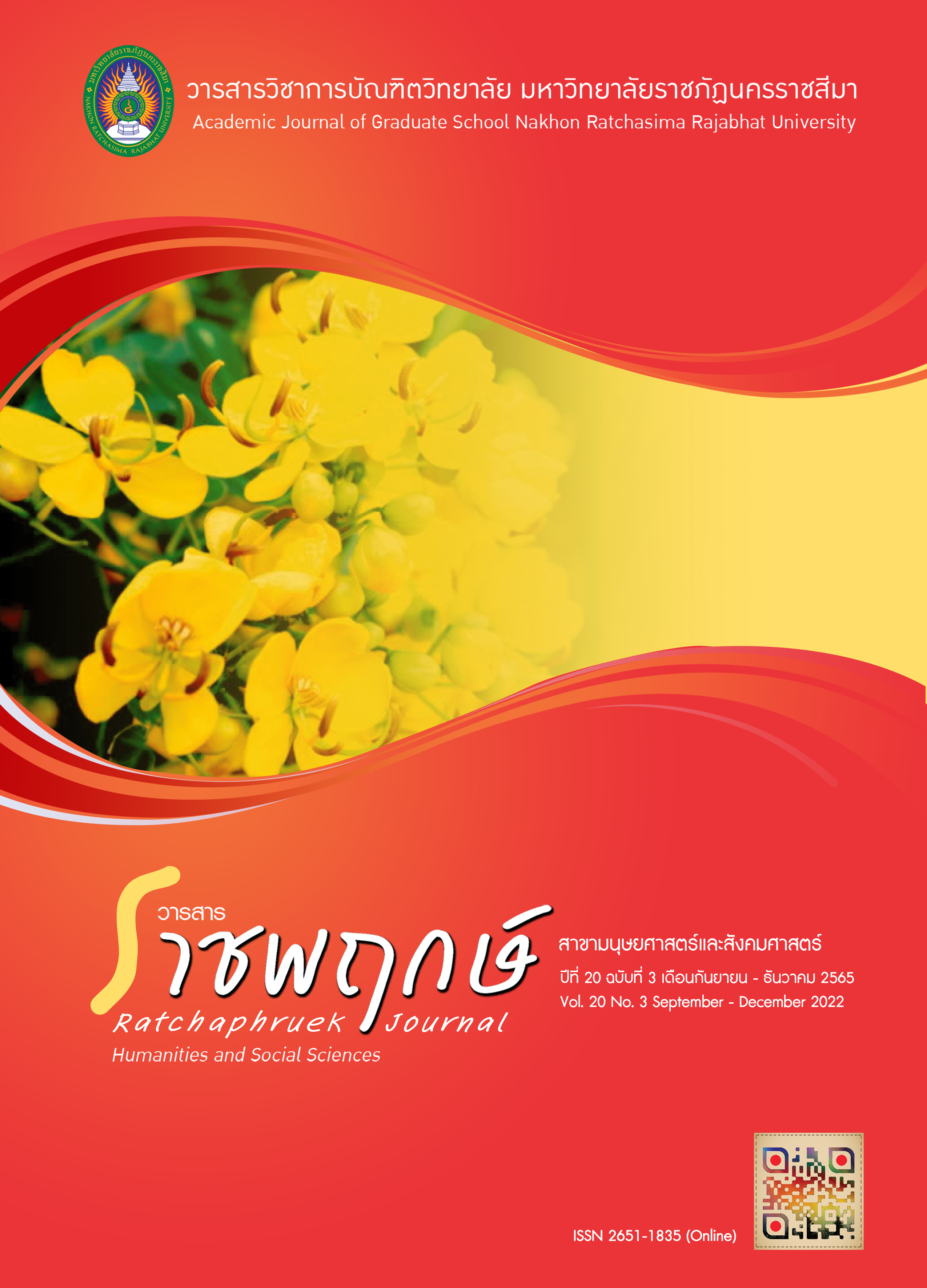Development of a Training Program to Enhance Entrepreneurship Competencies of Higher Education Students
Main Article Content
Abstract
This research studied the essential competencies based on current and future entrepreneurship competencies. The purposes to develop such a training program were to enhance the entrepreneurship competencies of higher education students. The sample group were; 15 of students, professors, and university administrators in 5 universities, 400 of entrepreneurs/employers who participated with 5 university students, 7 experts who experienced in entrepreneurship education, and 30 higher education students. The research instruments consisted of a questionnaire, a training program, and an evaluation form for the effectiveness of the training program. The statistical data were analyzed by mean, standard deviation, Priority Needs Index (PNIModified) to synthesize 12 entrepreneurship competencies, and t-test for dependent sample.
The results showed that 1) The six highest competencies appropriate to empirical data were critical thinking, embracing ambiguity, collaboration, communication, empathy, and creativity. 2) Development of a training program by using the standard component weights that statistically significantly higher than PNIModified 3.6. 3) The learning outcomes of the samples after the training were statistically significant (a = .01).
Article Details

This work is licensed under a Creative Commons Attribution-NonCommercial-NoDerivatives 4.0 International License.
References
ไกรยส ภัทราวาท. (2559). รายงานการสัมมนาการศึกษาไทย 4.0. สถาบันแห่งชาติเพื่อการพัฒนาเด็กและครอบครัว มหาวิทยาลัยมหิดล. นครปฐม: มหาวิทยาลัยมหิดล.
ทิพวรรณ เดชสงค์. (2561). การพัฒนาชุดฝึกอบรมเพื่อเสริมสร้างบทบาทการเป็นครูที่ปรึกษาโครงงานวิทยาศาสตร์สำหรับนิสิตนักศึกษาครูวิทยาศาสตร์ (วิทยานิพนธ์ดุษฎีบัณฑิต, มหาวิทยาลัยศรีนครินทรวิโรฒ).
นิภา ศรีวะรมย์. (2558). การส่งเสริมสมรรถนะความเป็นผู้ประกอบการให้แก่ผู้เรียนเพื่อเตรียมความพร้อมสู่ระบบเศรษฐกิจฐานความรู้ในศตวรรษที่ 21. วารสารพัฒนาเทคนิคศึกษา, 27(94), น. 119-121.
ไปรมา อิศรเสนา ณ อยุธยา และชูจิต ตรีรัตนพันธ. (2561). Design thinking: Learning by doing. กรุงเทพฯ: ศูนย์สร้างสรรค์งานออกแบบ.
พันธ์ยุทธ น้อยพินิจ, วนินทร สุภาพ และจักรกฤษ กลิ่นเอี่ยม. (2562). การวิจัยปฏิบัติการเพื่อการจัดการการเรียนรู้ เรื่อง ภาคตัดกรวยด้วยกระบวนการคิดเชิงออกแบบที่ส่งเสริมความสามารถในการแก้ปัญหาอย่างสร้างสรรค์ของนักเรียนชั้นมัธยมศึกษาปีที่ 4. วารสารพัฒนาการเรียนการสอน มหาวิทยาลัยรังสิต, 13(1), น. 70-84.
ไพฑูรย์ สินลารัตน์. (2559). ปรัชญาการศึกษาเชิงสร้างสรรค์และผลิตภาพ. กรุงเทพฯ: โรงพิมพ์แห่งจุฬาลงกรณ์มหาวิทยาลัย.
ภุชงค์ โรจน์แสงรัตน์. (2559). การพัฒนารูปแบบการสอนโดยใช้การคิดเชิงออกแบบเป็นฐาน เพื่อสร้างสรรค์ผลงาน ที่ปรากฏอัตลักษณ์ไทยสำหรับนิสิตนักศึกษาระดับปริญญาบัณฑิต (วิทยานิพนธ์ดุษฎีบัณฑิต, จุฬาลงกรณ์มหาวิทยาลัย).
รัชนีวรรณ ตั้งภักดี. (2560). ผลของการพัฒนาสมรรถนะการออกแบบการเรียนการสอน เพื่อการผลิตสื่อโดยใช้รูปแบบการสอนแบบชุมชนเป็นฐานการเรียนรู้ร่วมกับกระบวนการคิดเชิงออกแบบในนิสิตระดับปริญญาตรี. วารสารวิชาการ Veridian E-Journal, 10(3), น. 133-134.
ศรัณภัสร์ แวกโกเนอร์. (2562). การเสริมสร้างคุณภาพชีวิตของนักศึกษามหาวิทยาลัยราชภัฏในเขตกรุงเทพมหานคร (วิทยานิพนธ์ดุษฎีบัณฑิต, มหาวิทยาลัยศรีนครินทรวิโรฒ).
สำนักงานคณะกรรมการพัฒนาการเศรษฐกิจและสังคมแห่งชาติ. (2560). แผนพัฒนาเศรษฐกิจและสังคมแห่งชาติ ฉบับที่ 12. สืบค้นเมื่อ 30 กรกฎาคม 2562, จากhttps://www.nesdc.go.th/ewt_news.php?nid=6420&filename=develop_issue
สุภาภรณ์ อุดมลักษณ์. (2564). สมรรถนะการเป็นผู้ประกอบการและกลยุทธ์ในการจัดการเรียนการสอนที่ส่งเสริมสมรรถนะการเป็นผู้ประกอบการของนิสิตพยาบาล. วารสารสมาคมพยาบาลแห่งประเทศไทยฯ สาขาภาคเหนือ, 27(1), น. 93-99.
สุรเกียรติ ธาดาวัฒนาวิทย์. (2561). คุณลักษณะบัณฑิตที่สอดคล้องกับการพัฒนาประเทศไทยตามแนวประเทศไทย 4.0. วารสารวิทยาลัยดุสิตธานี, 12(2), น. 404-416.
Bacigalupo, M., Kampylis, P., Punie, Y. & Van den Brande, G. (2016). EntreComp: The Entrepreneurship Competence Framework. Retrieved October 22, 2020, from https://www.thewomensorganisation.org.uk/wp-content/uploads/2020/06/6.-Entrecomp-The-Entrepreneurship-Competance-Framework.pdf
Lackéus, M. (2015). Entrepreneurship in Education: What, Why, When, How. Entrepreneurship 360: Background Paper. Retrieved May 9, 2020, from https://www.oecd.org/cfe/leed/BGP_Entrepreneurship-in-Education.pdf
Lackéus, M. & Williams, M. K. (2015). Venture Creation Programs-Bridging Entrepreneurship Education and Technology Transfer. Education+Training, 57(1), pp. 48-73.
Lynch, M., Kamovich, U., Longva, K. K. & Steinert, M. (2021). Combining technology and entrepreneurial education through design thinking: Students' reflections on the learning process. Technological Forecasting and Social Change, 164(119689), pp. 2-10.
OECD. (2019). PISA 2021 Creative Thinking Framework (Third Draft). Paris: OECD. Retrieved May 9, 2020, from https://www.oecd.org/pisa/publications/PISA-2021-creative-thinking-framework.pdf
Sarasuk, K. P. (2018). How to apply design thinking process as a tool for creating a prototype bag from Tai-lue handwoven fabric remnants. Veridian E-Journal, Silpakorn University, 11(4), pp. 865-878.
Terzaroli, C. (2018). Developing entrepreneurship through Design Thinking: A new frontier for adult education. Epale Journal, 3(6), pp. 20-27.
Venesaar, U., Malleus, E., Arro, G. & Toding, M. (2021). Entrepreneurship Competence Model for Supporting Learners Development at All Educational Levels. Administrative sciences, 12(2), pp. 1-29.


